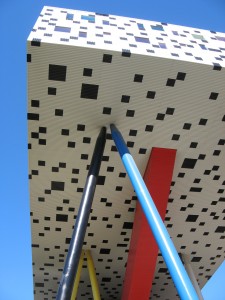Se viven en el extranjero que se sienta más creativos?
 People with experience living abroad tend to be more creative than those who spend their lives in their home country, de acuerdo con a study recently published in the Revista de Personalidad y PsicologÃa Social.
People with experience living abroad tend to be more creative than those who spend their lives in their home country, de acuerdo con a study recently published in the Revista de Personalidad y PsicologÃa Social.
William Maddux, an assistant professor of organizational behavior at INSEAD in France, y Adam Galinsky, a professor at Northwestern University’s Kellogg School of Management outside of Chicago, conducted several experiments to explore the link between living abroad and creativity.
En un estudio, MBA students were asked to solve a puzzle known as the “Duncker candle problem.” Researchers gave the students a candle, a pack of matches, and a box of tacks, all set on a table next to a cardboard wall. The students were told to attach the candle to the wall so that the candle burns without dripping wax on the table or the floor.
Sacado? Try emptying the tacks out of the box, tacking the box to the wall, and using the box as a candleholder.
De acuerdo con a summary of the research from the American Psychological Association, “the solution is considered a measure of creative insight because it involves the ability to see objects as performing different functions from what is typical (es decir, the box is not just for the tacks but can also be used as a stand).”
“Los resultados mostraron que the longer students had spent living abroad, the more likely they were to come up with the creative solution.”
En otro estudio:
…the researchers used a mock negotiation test involving the sale of a gas station. In this negotiation, a deal based solely on sale price was impossible because the minimum price the seller was willing to accept was higher than the buyer’s maximum. Sin embargo, because the two parties’ underlying interests were compatible, a deal could be reached only through a creative agreement that satisfied both parties’ interests.
Aquà de nuevo, negotiators with experience living abroad were more likely to reach a deal that demanded creative insight.
In both studies, time spent traveling abroad did not matter; only living abroad was related to creativity.
The authors pointed out that while these studies “show a strong relationship between living abroad and creativity, ellos no prueban that living abroad and adapting to a new culture actually causar people to be more creative.”
To help get at this question of what causes someone to be creative, the authors tried a technique called “priming.†In two experiments, they asked groups of undergraduate students at the Sorbonne in Paris to recall and write about a time they had lived abroad or adapted to a new culture; other groups were asked to write about other experiences, such as going to the supermarket, learning a new sport or simply observing but not adapting to a new culture.
The results showed that priming students to mentally recreate their past experiences living abroad or adapting to a new culture caused students, at least temporarily, to be more creative. Por ejemplo, these students drew space aliens and solved word games more creatively than students primed to recall other experiences.
Author Maddux concluded, "Knowing that experiences abroad are critical for creative output makes study abroad programs and job assignments in other countries that much more important, especially for people and companies that put a premium on creativity and innovation to stay competitive.â€
Foto © Carolyn B. Heller




















